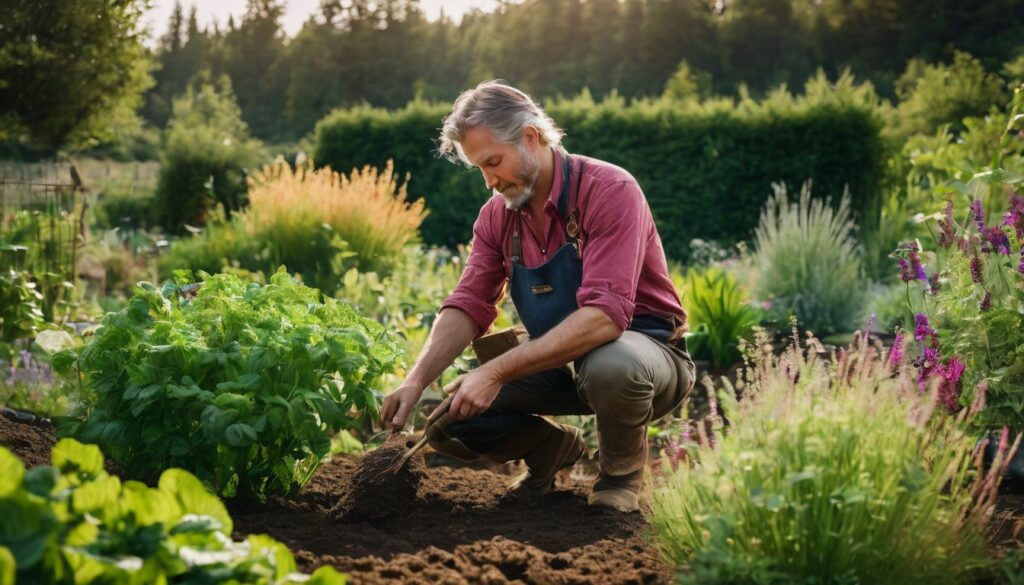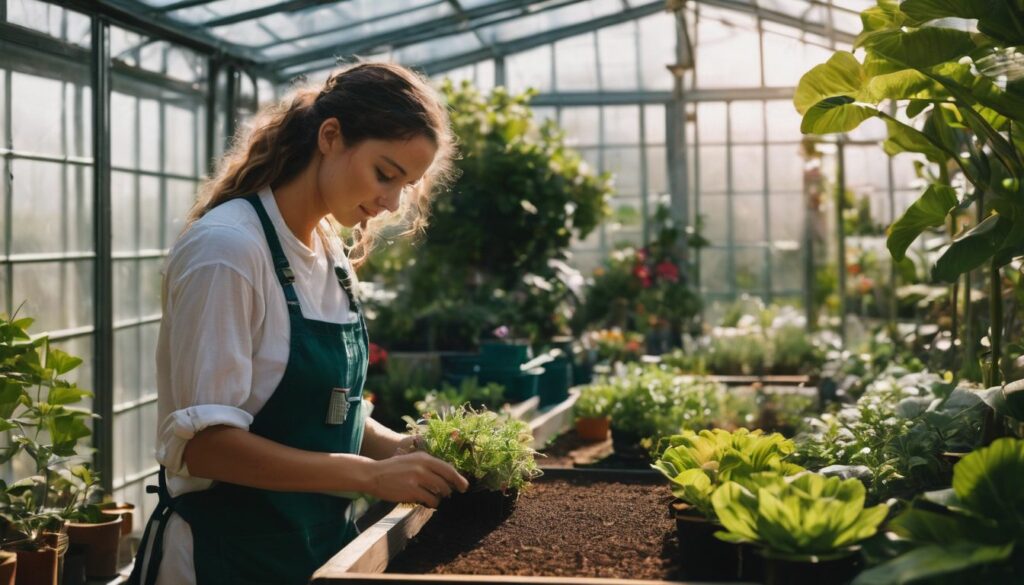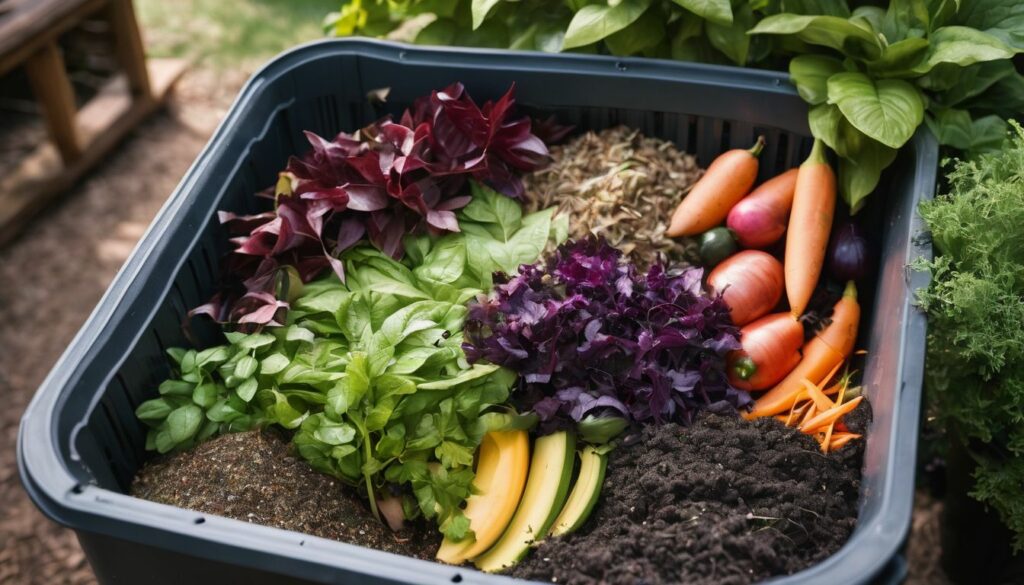Are you looking for a farming approach that heals the earth while it nourishes us? Maybe you’ve heard of organic practices, but there’s something more – a method steeped in harmony with nature and enriching the very ground we walk on.
This is where biodynamic farming steps in. Picture this: a form of agriculture that not only focuses on sustainable crop production but also considers celestial rhythms and spiritual principles as part of its core.
Biodynamic farming isn’t just about avoiding pesticides; it’s an age-old practice revived by Rudolf Steiner, emphasizing balance and interconnectivity between soil, plants, animals, and humans.
It treats farms like living organisms—with hearts beating to nurture every element within. In our journey ahead, we’ll unveil how this holistic method goes beyond typical cultivation strategies to embrace ethical stewardship of our land.
Ready to explore a world where natural cycles dictate planting times and cosmic forces are harnessed for harvest? Let’s dig deeper into the nurturing arms of biodynamic farming—where each scoop of earth holds potential for profound growth.
Keep reading to unearth secrets from beneath the soil!
Key Takeaways
- Biodynamic farming, pioneered by Rudolf Steiner in the 1920s, is a holistic and ethical approach that emphasizes the interconnectedness of soil, plants, animals, and cosmic influences.
- The philosophy behind biodynamic farming goes beyond organic practices by treating farms as self-sustaining organisms, integrating ecological, social, and economic sustainability principles while aiming to enhance overall well-being.
- Key practices of biodynamic farming include on – farm fertility through composting and crop rotations, cultivating a positive relationship with animals for ecological balance,
What is Biodynamic Farming?
Biodynamic farming is a holistic and ethical approach to agriculture that emphasizes the relationship between soil, plants, and animals, while also considering the impact of natural rhythms and cosmic influences.
History and origins
Rudolf Steiner, an Austrian philosopher, started biodynamic farming in the 1920s. He gave a series of lectures to farmers who were worried about their unhealthy soil and weak crops.
From these talks came the idea that farms could be like living things: whole, self-sustaining systems with animals, plants, and soil working together.
This way of farming quickly spread as more people saw it made their land healthier. It also helped them grow better food without using chemicals. Today, growers all over the world use this holistic approach to care for their lands and communities.
They follow Steiner’s ideas to create farms that are full of life and good for nature.
Philosophy
Rooted in the work of Rudolf Steiner, the philosophy behind biodynamic farming emphasizes a holistic and ethical approach to agriculture. It goes beyond traditional organic farming by considering the farm as a self-sustaining organism, integrating ecological, social, and economic sustainability principles.
Biodynamics respects the interconnectedness of soil health, biodiversity, and cosmic rhythms while aiming to enhance not just agricultural production but also the overall well-being of farmers, consumers, and communities.
This spiritual focus on human connection with nature guides farmers towards utilizing natural materials such as composts and manures instead of synthetic inputs to promote regenerative agricultural practices in harmony with the environment.
Certification
Biodynamic farming certification is based on the principles and practices set forth by Demeter International, the oldest ecological certification organization. It goes beyond organic standards and requires strict adherence to biodynamic methods, including biodiversity conservation, holistic pest management, and soil revitalization.
Farms seeking certification must also demonstrate ethical treatment of animals and a commitment to sustainable land stewardship.
Certified biodynamic products are easily identified by the Demeter logo, ensuring consumers that they are supporting agricultural practices aligned with ecological sustainability and ethical values.
Biodynamic Principles and Practices
Farm individuality is emphasized in biodynamic farming, with a focus on creating a self-sustaining ecosystem within the farm. On-farm fertility and the relationship with animals are central to sustainable agriculture practices, along with biodiversity and holistic pest management.
Biodynamic farming also aims to have a positive impact on social and economic health within the community.
Farm individuality
Biodynamic farming recognizes that each farm is unique, with its own distinct characteristics and ecology. This approach values the individuality of each farm and aims to enhance its natural features through sustainable practices.
By understanding and respecting the specific qualities of a farm, biodynamic farmers can work in harmony with the land, promoting biodiversity, soil health, and overall sustainability.
This principle aligns with the idea of agroecology and permaculture, emphasizing the interconnectedness of all elements within a farming system.
On-farm fertility
Biodynamic farming emphasizes on-farm fertility through the use of compost and crop rotations. In this approach, the focus is on creating healthy soil using natural methods rather than synthetic inputs.
The compost heap in biodynamic farming is treated with medicinal substances, contributing to the overall fertility of the farm. This practice aligns with the principles of ecological and ethical farming, ensuring that the land remains fertile and productive without relying on artificial aids or chemicals.
In biodynamic farming, maintaining on-farm fertility involves managing a farm utilizing living organism principles instead of solely focusing on producing specific crops. Through this approach, biodynamic farmers work towards building sustainable agricultural systems that prioritize soil health and vitality, ultimately supporting long-term farm fertility and productivity.
Relationship with animals
Biodynamic farming regards animals as an integral part of the farm organism. Livestock are raised with respect to their natural behaviors and wellbeing, and they play a key role in maintaining the farm’s ecological balance.
Animals contribute by providing manure for compost, enhancing soil fertility, and supporting biodiversity through their grazing activities. Their integration into the farming system reflects biodynamics’ emphasis on creating a self-sustaining and harmonious environment where animals are valued partners in the regenerative processes.
This approach aims to create a balanced ecosystem where animals live in conditions that allow them to express their innate behaviors while contributing positively to the overall health of the farm.
Biodiversity and holistic pest management
After fostering relationships with animals, biodynamic farming emphasizes the importance of biodiversity and holistic pest management. Biodiversity is crucial for maintaining a balanced and resilient ecosystem on the farm.
By cultivating a diverse range of plant species, farmers can support natural pest control and reduce the reliance on chemical interventions. Additionally, practicing crop rotation and integrating livestock helps in pest control by disrupting insect life cycles.
Biodynamic farms also utilize herbal remedies like nettle or chamomile tea to manage pests while promoting overall ecosystem health.
Moreover, biodynamic farming encourages the presence of beneficial insects and wildlife through measures such as hedgerows, wildflower strips, and maintaining natural habitats within the farm.
Impact on social and economic health
Biodynamic farming has a positive impact on social and economic health. By embracing community involvement, it strengthens the local social fabric, encouraging collaboration among farmers and consumers.
This fosters a sense of belonging and interdependence within the community, promoting sustainable living. Economically, biodynamic farming minimizes dependency on external inputs by emphasizing self-sufficiency through composting and natural fertilizers.
This leads to reduced production costs and increased profitability for farmers.
Furthermore, biodynamic practices prioritize fair trade and ethical labor principles, benefitting both the workers involved in cultivation as well as consumers who support these values.
These factors collectively contribute to improved well-being within the community while also creating opportunities for economic growth.
Biodynamic Practices
Biodynamic Practices include the use of biodynamic preparations for soil and plants, utilizing compost, applying biodynamic sprays, and farming in rhythm with Earth and cosmos.
Biodynamic preparations for soil and plants
Biodynamic farming uses special preparations for soil and plants. These preparations are made by stuffing specific herbs into the intestines of animals like cows or deer, and then buried in the ground. The purpose is to enhance soil fertility and stimulate plant growth naturally.
- These preparations aid in composting processes, promoting the breakdown of organic matter and enriching the soil with beneficial microorganisms.
- They also help plants develop resistance to diseases and improve their overall health.
- The biodynamic approach believes that these preparations harness cosmic forces, bringing balance and vitality to the farm ecosystem.
- The use of these unique preparations sets biodynamic farming apart from conventional agricultural practices.
- Farmers apply these treatments at specific times following a biodynamic calendar based on lunar and celestial rhythms, believing it enhances their effectiveness.
Use of compost
In biodynamic farming, the use of compost is fundamental for nurturing soil health and fertility. The compost pile is not just a mix of organic matter; it’s treated with special preparations made from medicinal plants and minerals.
This enhances the vitality and quality of the compost, which in turn enriches the soil microbiology and supports robust plant growth. The emphasis on utilizing nutrient-rich compost aligns with biodynamic principles that aim to create a self-sustaining ecosystem within the farm environment.
By harnessing the power of natural materials through composting, biodynamic farmers aim to cultivate vibrant, healthy soil that forms the cornerstone of their regenerative agricultural practices.
Biodynamic sprays
Transitioning from the use of compost, biodynamic farming also involves the application of special sprays that are prepared in a specific manner. These sprays are made from various natural substances such as manure, minerals, and herbs, which are carefully selected and then fermented to create potent solutions.
The purpose of these biodynamic sprays is to enhance the vitality and healing capacities of the plants while promoting overall soil health. Each spray is applied at specific times during the year to correspond with different phases of plant growth and cosmic influences, aligning with the holistic approach of biodynamic farming.
The intention behind using these sprays is to stimulate biodiversity through harnessing natural processes.
Farming in rhythm with Earth and cosmos
Biodynamic farming involves farming in harmony with the Earth and cosmos through planting, cultivating, and harvesting according to celestial cycles. This includes aligning sowing and planting times with lunar and cosmic rhythms to optimize plant growth.
The farm is seen as a living organism influenced by the movements of planets, stars, and other celestial bodies. Biodynamic farmers work closely with nature’s rhythm to enhance soil fertility, promote healthy crops, and maintain ecological balance.
By respecting these natural cycles, they aim to create a more sustainable and resilient agricultural system that benefits both the environment and the community.
The holistic approach of biodynamic farming extends beyond traditional agricultural methods by embracing practices that honor the interconnectedness of all living things. It encourages an attuned sensitivity towards environmental cues in order to foster a healthier relationship between plants, animals, humans, and the universe at large.
Resources and Community
Biodynamic research and education, membership and community involvement, as well as partnerships and alliances are essential components of the biodynamic farming movement.
Biodynamic research and education
Biodynamic research and education are essential components of promoting this holistic farming approach. Research in biodynamics focuses on understanding the impact of farming practices on soil health, biodiversity, and plant nutrition.
It explores alternative agriculture methods that work in harmony with nature. Additionally, educational initiatives aim to spread awareness about the principles and practices of biodynamic farming, providing training programs for farmers and gardeners to adopt sustainable techniques.
These efforts contribute to building a community of like-minded individuals who are committed to regenerative agriculture and ecological farming.
Membership and community involvement
Biodynamic farming encourages membership in biodynamic associations and community involvement. By joining these groups, farmers can gain access to resources, knowledge sharing, and support from a network of like-minded individuals.
Community events such as workshops, farm tours, and conferences provide opportunities for learning and collaboration among biodynamic practitioners. Additionally, partnerships with local businesses and organizations foster a sense of belonging in the larger community while promoting the principles and practices of biodynamic farming.
Partnerships with local businesses often lead to collaborations that benefit both parties. This engagement strengthens the connection between biodynamic farms and their surrounding communities, contributing to mutual growth and sustainability.
Partnerships and alliances.
In addition to community involvement, biodynamic farming also values partnerships and alliances. These collaborations often extend beyond the farm to include local businesses, educational institutions, and other organic farming communities.
By forming partnerships with like-minded organizations and individuals, biodynamic farmers can share knowledge, resources, and best practices. This not only strengthens the agricultural network but also enhances the overall sustainability and resilience of biodynamic farming.
These alliances may also contribute to the promotion of biodynamic products and principles within wider markets.
Conclusion
In summary, biodynamic farming is a holistic and ethical approach rooted in creating healthy soil and respecting the ecology. Its practical methods, such as composting and crop rotations, are efficient and easy to implement.
By embracing these principles, farmers can experience significant improvements in their farms’ health while contributing to the environment. For further exploration, resources like biodynamic research and community involvement offer additional guidance for those interested in this sustainable farming approach.
Let’s all take a step towards a more connected and ecological way of farming.
FAQs
1. What is biodynamic farming?
Biodynamic farming is a way of growing food that follows natural cycles and uses special methods to enrich the soil and grow plants.
2. How does biodynamic farming work?
In biodynamic farming, farmers use compost, plant diversity, and follow the moon’s phases to make sure their farms stay healthy and produce good food.
3. Is biodynamic farming like organic farming?
Yes, it’s similar because both avoid chemicals but biodynamic farming also uses special preparations based on principles to improve soil health and help plants grow better.
4. Why do some people say biodynamic practices are pseudoscientific?
Some folks think the ideas behind using moon cycles and other parts of nature in this type of farming don’t have enough science proof yet; they call it pseudoscientific because they want more studies done.





